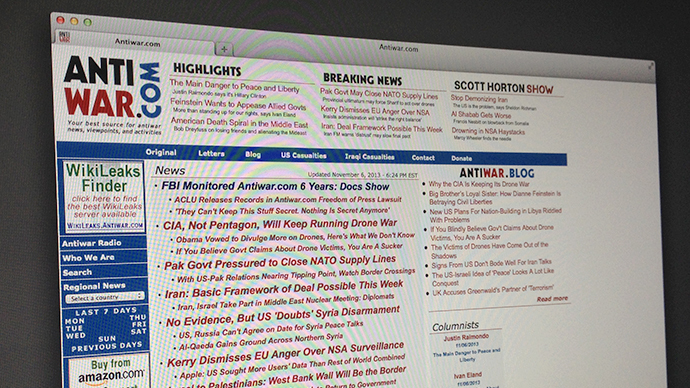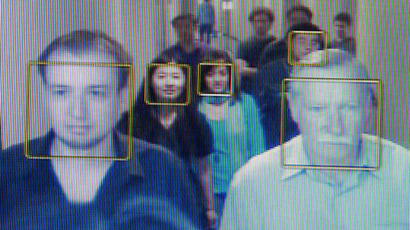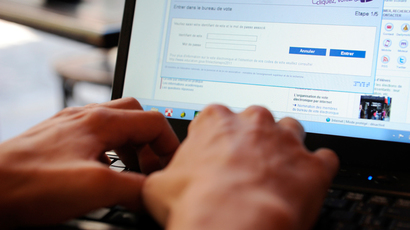Anti-war site, upon notifying FBI of cyber-threat, became surveillance target

The Federal Bureau of Investigation spent years conducting surveillance on a prominent libertarian anti-war web site, in part because the agency mistakenly believed that the activist page had tried to hack the FBI's own site, according to a new report.
FBI documents viewed by the The Guardian reveal that an investigation into Antiwar.com was motivated by an examination of a “threat” that planned to “hack the FBI web site.” Yet the site never threatened any such thing.
Heavily censored documents obtained through a Freedom of Information Act (FOIA) request indicate that Eric Garris, managing editor of Antiwar.com, had simply notified the FBI that Antiwar.com was the target of a hack. Somehow, months later, the FBI filed Antiwar.com as a potential cyber threat against the FBI, a mistake that lasted for years and effectively gave the FBI the power to monitor the inner workings of the site, which is often critical of US foreign policy.
“The improper investigation led to Garris and [Editorial Director Justin] Raimondo being flagged in other documents, and is based on inappropriate targeting and sloppy intelligence work the FBI relied on in its initial memo,” Julia Mass, an American Civil Liberties Union attorney in northern California, told The Guardian.
According to the documents, Garris received an email on September 12, 2001 with a subject reading, in all capital letters, “YOUR SITE IS GOING DOWN.”
“Be warned assholes, I’ll be posting your site address to all the hack boards tonight, telling them about the little article at the moscowtimes and all. YOUR SITE IS HISTORY,” the message continued, although much of the transcript was redacted by the FBI.
On January 7, 2002 -months after Garris forwarded the messages to
the FBI office – the bureau classified the notifications as “A
THREAT BY GARRIS TO HACK FBI WEBSITE.”
Garris told The Guardian he never heard back from the FBI and the incident seemed to lie dormant for years, until he saw mention of it in his own FBI files.
“It was pretty scary to think that in my FBI files, and perhaps other government agency files, there was a report that I was considered a threat based on that,” he said. “That may follow me for the rest of my life. Any time I interact with any law enforcement or government agencies, they’re going to be able to see that, and make evaluations of me on it. It’s very scary.”
The Newark, New Jersey FBI office assembled a “threat assessment” report on Garris and Raimondo, noting their anti-war views, recording their articles and media appearances in which the pair espoused critical opinions. Also included are transcripts of articles written by Raimondo speculating that Israel had advance knowledge of the September 11, 2001 terrorist attacks.
“The rights of individuals to post information and to express personal views on the internet should be honored and protected; however, some material that is circulated on the internet can compromise current active FBI investigations,” one unnamed analysts wrote in the report, as quoted by The Guardian. That person added that the site’s source of funding and Raimondo’s true identity were among “several unanswered questions regardingwww.antiwar.com.”
The ACLU filed the FOIA request against the FBI, which is known to have monitored an array of nonviolent protest groups and media organizations in the years after 9/11.
“The ACLU brought this case because government surveillance of news organizations undermines democracy and interferes with journalists’ ability to do their jobs,” said Julia Harumi Mass, an ACLU attorney.














